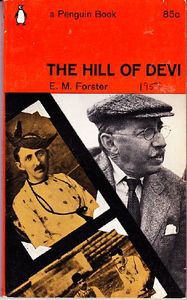The Hill of Devi Review

The Hill of Devi by E. M. Forster.
E. M. Forster, Morgan to his friends, sits down after WWII and puts together this slim volume collecting letters and remembrances of two visits to India. In 1912 he is introduced to the Maharajah of Dewas Senior and nine years later is employed for a brief time as his private secretary. He recollects the time with minimal self-consciousness, his brief mentions of unrest and Gandhi relegated to his letters, and a tinge of antiquated nostalgia. In 1921 he already sees Dewas gone, absorbed into Madhya Bharat, before it actually happens. The India he visited in 1949, for the modern reader, has already changed dramatically. Sharing similar culture, having the history, but this India as different for us as pre-WWI India was for Forster.
I don't make it a secret that E.M. Forster is my favorite author, despite the fact that I've read only one of his novels. His style, openly visible in the letters he wrote home, is comfortable and focused, filling us in with only a few words, pulling us in and sharing with us an intimate friendship with a man very few new, while many knew of him. The casual modern reader will not be familiar with His Highness, the Maharajah of Dewas Senior, known as Bapu Sahib before he was king - and how he is known to his friend Morgan. You will also be unlikely to be familiar with the catastrophe that occurred after Forster left his service - but not as a result thereof. I would encourage you not to familiarize yourself but to experience India through Forster's eyes.
It is the catastrophe, and the small instances, discrepancies and hallows of everyday life that distinguish themselves to Forster. He omits the 'isn't India quaint!' but leaves the references to shoddy roads, holy cows, bad English, eagerness, affection and incompetence. His writing of India is not what I would consider quaint, not unless the definition has changed.
Instead, the humor and affection, despite his dislike of the unremarkable landscape of Dewas, shines though. He is bemused by the elderly pug, Lady, which accompanies the Maharajah everywhere. He is baffled by India in general, remarking: "The arrangement must have been unique, and an authoritative English lady, who knew India inside out, once told me that it did not and could not exist, and left me with the feeling that I had never been there." p33
I don't make it a secret that E.M. Forster is my favorite author, despite the fact that I've read only one of his novels. His style, openly visible in the letters he wrote home, is comfortable and focused, filling us in with only a few words, pulling us in and sharing with us an intimate friendship with a man very few new, while many knew of him. The casual modern reader will not be familiar with His Highness, the Maharajah of Dewas Senior, known as Bapu Sahib before he was king - and how he is known to his friend Morgan. You will also be unlikely to be familiar with the catastrophe that occurred after Forster left his service - but not as a result thereof. I would encourage you not to familiarize yourself but to experience India through Forster's eyes.
It is the catastrophe, and the small instances, discrepancies and hallows of everyday life that distinguish themselves to Forster. He omits the 'isn't India quaint!' but leaves the references to shoddy roads, holy cows, bad English, eagerness, affection and incompetence. His writing of India is not what I would consider quaint, not unless the definition has changed.
Instead, the humor and affection, despite his dislike of the unremarkable landscape of Dewas, shines though. He is bemused by the elderly pug, Lady, which accompanies the Maharajah everywhere. He is baffled by India in general, remarking: "The arrangement must have been unique, and an authoritative English lady, who knew India inside out, once told me that it did not and could not exist, and left me with the feeling that I had never been there." p33
I was amused but frustrated by the intimacy with which his letters were written, we had no idea to whom he wrote, though most of his letters were written to his mother, I assume. The Maharajah's own mother was sorely missed and because of his familiarity with her son, the Maharajah would be affectionate in his own letters to her, knowing the worth of such a figure in his own life:
"Years after her death, he still mourned her, and one day he lamented to me, while tying a turban, that he no longer took pleasure in tying it, now that the beloved voice which could praise his skill had gone. 'It is only for the sake of those who love us that we do thing.' A dangerous creed." p37
Speaking of turbans, Forster was, for one reason or another, fond of relaying not only the unique fashions of India in his letters, but fabrics, colors and result effects thereof. While he might find a particular combination displeasing, it often works well among his peers in the royal court. He remarks on the colors and lovely dress of his friend's wife and his concubine, the intrigue and gossip easily following behind. The drama between the Maharajah and his courtiers, between the Dowager, his aunt, and Bai Saher, his 'diamond' concubine, is almost as ridiculous as what you might expect at any royal court - but H.H. gets himself as readily involved as the next man, suspecting a poison plot anytime he is forced from the Old Palace to the New Palace in the city, and chillingly comfortable around the spies sent to his court.
This slim volume is a collection of letters from a time in India, commentary and expansion upon his letters added thirty years later, but Forster amends himself in the end: it is the study of a man. I might even go so far to say it is the story of an uncertain and intimate friendship between intellectuals, men who respect each other and are comfortable with each other.
The subsequent tale of 'catastrophe' was carried by the Times of India and the London Times, but herein Morgan remembers a man who was complex and saintly, affectionate to those whom he judged sincere. He was intellectual and spiritual, even while unwise and prone to believing gossip. A wonderful effort.
175pp. Penguins Books. 1965.
(Read/Skim/Miss) (Buy/Borrow)
 2
2



![The Glass Rainbow: A Dave Robicheaux Novel [Audiobook, Unabridged] [Audio Cd] - JAMES LEE BURKE](http://booklikes.com/photo/max/50/80/upload/books/81/83/ec3df04145602bdf962e820cf15b22f7.jpg)
